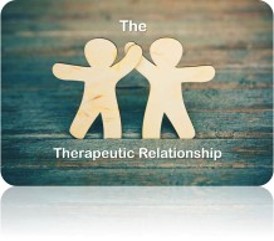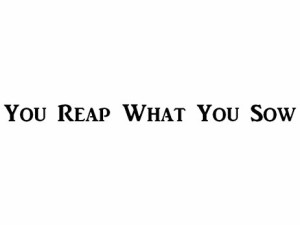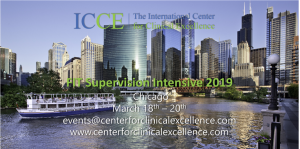 Most clinicians agree, the therapeutic relationship is an important ingredient in effective psychotherapy.
Most clinicians agree, the therapeutic relationship is an important ingredient in effective psychotherapy.
However, ask them the last time they: (1) read a study on the subject; (2) attended a postgraduate training specifically aimed at improving their skills in this area; or simply to (3) identify and define the factors contributing to an effective relationship, and the answers you’ll get are far more variable.
Why is that? Why doesn’t the therapeutic relationship get more attention in coursework and postgraduate training?
The truth is, while clinicians readily acknowledge the bond they form with clients matters, they deeply believe other factors are more critical to outcome.
How do we know? Research.
As far back as 1996, data began to emerge. In their very interesting study, researchers Sandra Eugster and Bruce Wampold found that therapists’ evaluations of their clinical work were inversely related to the quality of the working relationship. Think about that! The better the relationship, the worse evaluation therapists gave of their clinical work. What mattered most? Technical expertise!
 For clients, the picture was quite different. The relationship was the real deal — in particular, their experience of being related to, “in a manner or degree not solely prescribed by the formal role of [the] therapist … subtle clues of authenticity and genuine human relatedness” (p. 1024-5).
For clients, the picture was quite different. The relationship was the real deal — in particular, their experience of being related to, “in a manner or degree not solely prescribed by the formal role of [the] therapist … subtle clues of authenticity and genuine human relatedness” (p. 1024-5).
While unsettling, such findings should surprise no one. From the outset of training, therapists are not valued for their humanness or personhood, but rather their theoretical knowledge and technical proficiency. In fact, a recent study done in Australia finds between 40 and 47% of graduate programs in psychology make no reference to relationship skills in their course syllabi, program descriptions, or list of training competencies (watch the interview below with one of the lead researchers). These facts, combined with frequent “admonitions against over-involvement, breach of boundaries, …and other such departures from good technique” (Eugster & Wampold, p. 1025), establishes a “vicious cycle” that continues after graduate school — one in which practitioners, and the field, are forever attempting to improve effectiveness by learning new diagnoses, therapy-related terminology, and treatment models.
The latest issue of the journal Psychotherapy goes a long way toward disrupting “business as usual.” Every article is focused on the therapeutic relationship. Here are some of the highlights. If you want to be more effective, bypass learning the latest treatment technique and focus instead on:
- Improving your ability to respond emphatically;
- Putting more of yourself into therapeutic interactions;
- Becoming better at working collaboratively to develop and maintain an explicit agreement on the goals of treatment as well as the respective roles and tasks of various participants (e.g., the therapist and client/s); and
- Routinely and formally assessing the quality of the therapeutic relationship, taking time to address any problems/ruptures in real time.
Here’s one additional resource: my interview with psychologist, Crystal McMullen, the lead researcher of the study mentioned above documenting the dearth of training on the therapeutic relationship. “It takes decades for the psychology industry to let anything go,” she observes, “but, there is a change in the air…”. Hear what is at the core of her optimism, as well as detailed suggestions for the future of the field.
Until next time,
Scott
Scott D. Miller, Ph.D.
Director, International Center for Clinical Excellence
Looking for training on the alliance? That is the focus on our upcoming March intensives:



Scott,
I really enjoyed the interview! Do you have a link or the title of Dr. McMullen’s study?
Thanks!!!
I do not Paul. Actually, I’m pretty sure its not yet in print. You can email Crystal, however. Her email is at the end of the interview.
Scott
I’ll be receiving my LPC soon and in my Master’s studies at Methodist Theological School of Ohio, the therapeutic relationship is considered the most important component of therapy. That is drilled into us….without that, there can be no actual therapy or work.
Gail, that’s encouraging that TA is taught as the most important component of therapy! I’m wondering if you also receive training about specific skills for creating a strong alliance and practice developing them? If so, are you willing to share a bit about how your program does this? (My program was Masters Clinical Mental Health Counseling to obtain LPC, and we were taught ABOUT TA and had one course one semester of microskills practice, which was the only actual *skills* practice we received before internship, and those skills were not explicitly taught as being connected to alliance. Sigh. I’d love to hear more about differing experiences.)
An eye opening interview about the place of alliance building and relationship that needs to be seriously addressed in therapy and counseling programs. I have a clinical doctorate in social work. In my masters program we used a text: “Theory and Practice of Social Case Work” by Gordon Hamilton (1940,1951). In her introduction she makes the alliance the key factor in practice. She says, “So far as we know it is only b y means of a deeply felt experience in relationship that treatment can affect a person’s attitudes toward himself and his fellows. We shall therefore begin our discussion of process with the dynamics of the casework relationship.” In my doctoral therapy practicum the focus was on the application of psychodynamic theory in practice. I remember my supervisor saying to me,”Edward, your understanding of psychodynamics has not improved but your patients are getting better. “I did not know whether this meant I was failing or if it was a compliment. Thanks for the affirmation contained in this tape
Thanks so much Edward!
Great point Scott. I have to re-read.
Ciao.
Adriano
Thanks so much Adriano!
Thank you, Scott. Our profession needs a great deal more research on this.
Thank you Scott for challenging this emphasis on ‘expertise in technique’ and devaluing of relationship. I can reassure you that in our postgraduate psychology program here we have worked hard to build the ability of students to bring the balance of art and science to their work. All our students undertake a semester of interpersonal skills and we build the program around a deeply respectful process where the client in at the centre and the ‘dance’ can really take place. We seek to develop not just skilled practitioners but gracious practitioners…..Not always easy to sell our message to the wider profession or to APAC etc and the powers that be and not compromise the rigor and insight. But it is so worth it when we see the wonder of the people who leave us at the end of their program with skill but a deep sense of their humanity….So proud of them! Technique and diagnosis and evidence are valuable but will never replace graciousness and curiosity and imagination and hope and deep and profound respect for others…..Thank you for showing there is real and abiding evidence for such….There is no competition here; both make us great ‘fighters’ for those who need it most….the vulnerable people who need us fir just particular point in their lives.
IMHO, the basic problem is that psychotherapy has yet to understand (a) its subject matter; i.e., as chemistry did with the Periodic Table and medicine did with the discovery of microorganisms and antibiotics, and (b) the most common client experience (after talking), emotional experiencing.
Psychotherapy’s subject matter is, for me, the client’s experiencing, rather than that person’s symptomatology, and the client’s experiencing is best understood in the following way: (a) the typical presenting problem (until shown otherwise) has an interpersonal origin, and (b) the client – or the human being who is in the role of the client – is, therefore, the expert, rather than any theory, on how he/she has been affected by such an experience.
And, the most effective method of treatment is my concept of therapeutic catharsis, a fundamental reconceptualization of how catharsis has been historically understood. This concept assumes the existence of a natural healing process for such interpersonal experiences, and it offers a criterion for differentiating between a therapeutic cathartic/emotional release and a non-therapeutic one. That criterion is the unforced activation, and therefore not re-traumatizing. of the client’s emotional experiencing; i.e., it emerges coincident with the client receiving sufficient support her/his experiencing, Here, the therapist’s role is that of a midwife, someone who creates the condition for a natural process to operate.
In the issue of Psychotherapy Scott referred to above with a focus on the therapeutic relationship, not one of the ten or so articles mentioned emotional experiencing as having any therapeutic importance. All major therapeutic approaches do have at least one thing, a self-inflicted blind spot – and for no rational that I’m aware of – about the value of heightened emotional experiencing.
Scott, as I am sure you are aware, David Burns at Stanford focuses extensively on a kind of radical empathy as part his T.E.A.M. approach (E is for empathy), and it figures prominently in his workshops including his presentations at the Evolution of Psychotherapy conferences every few years. He offers continuous ongoing training for those fortunate to live in the greater Stanford area.
I was very interested when you asked Dr. McMullen if she’s found anything the practicing professional would find valuable for strengthening skills for building alliance… So far I’ve been been taking a guess about how to go about this. My work (in an outpatient, mostly group-based substance use program) has been very influenced by William Miller (who was very influenced by Rogers). What I know from the Motivational Interviewing approach is to work on partnership, compassion, evocation, and acceptance (with acceptance including absolute worth, affirmation, accurate empathy, and autonomy). These are specific skills I try to develop through deliberate practice and feedback with my team in a peer learning group. I also have gotten some professional coaching based on my performance to MI fidelity measures (so that is, I believe, one way these skills can be measured and improved). I’m *hoping* this is a good start for working on alliance…but this is really just a guess on my part about where to focus my attention, hoping these specific skills contribute to alliance. I also hope to delve more into Rogers, of course, and trying to learn ways to deliberately practice and improve creating his core conditions. AND I’m really just beginning to learn about FIT and trying to figure out how to incorporate it into the work I already do in my agency. If I ever decide to transition to providing individual mental health counseling, I know I will seek formal training in using FIT hopefully before I make that jump.
Thank you for this blog post. Even non-clinicians value your work. I continue to find the measurable aspects in conflict with the deep-seeded need for more people to desire going into in the therapy profession. I continue to hope that your work inspires people within the field to re-examine possibilities.
We had you come up to Ottawa to do a two day presentation to us years ago. I can’t even count the number of times I have said “find out what is juicy to your client”, since then. Your focus on the alliance and authenticity and having the research to back it up changed my practice. Thank you Scott. Peace to you and yours.
Hi Scott,
I’m very happy to report that my postgraduate studies in Counselling at USQ have included continual reminders about the importance of the therapeutic relationship and looking at what works. It is a recurring theme throughout the program..
Kind regards,
David Foster